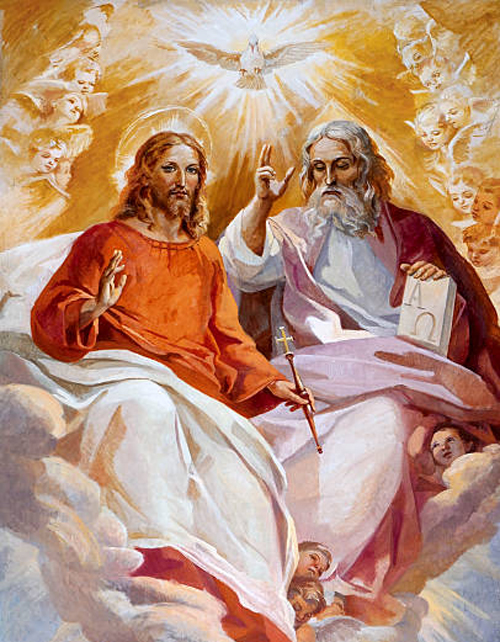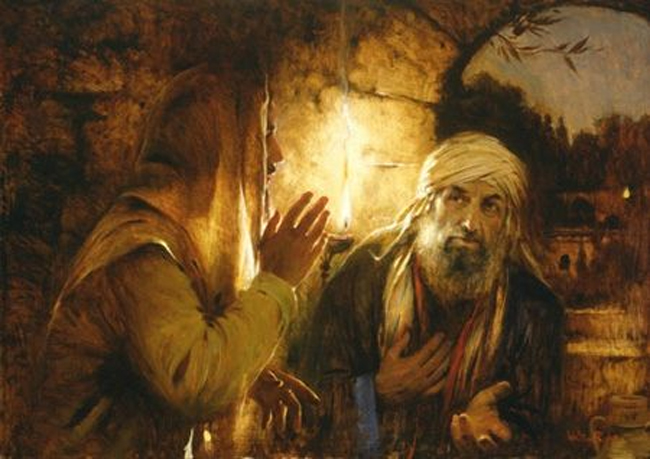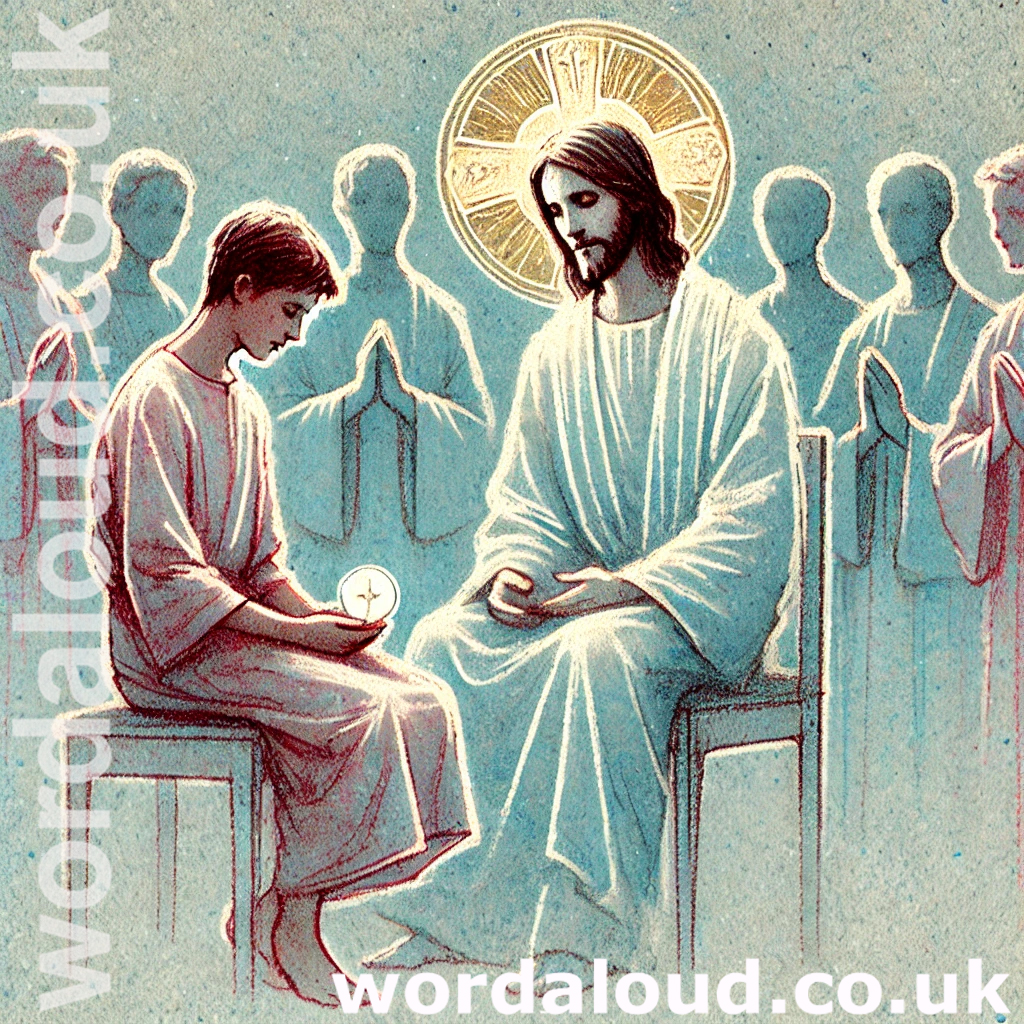Christian Art | Jesus And The Father
John 8: 31-42 – Lent Week 5, Wednesday (Audio Bible, King James Audio Bible, Spoken Word)
31 Then said Jesus to those Jews which believed on him, If ye continue in my word, then are ye my disciples indeed;
32 And ye shall know the truth, and the truth shall make you free.
33 ¶ They answered him, We be Abraham’s seed, and were never in bondage to any man: how sayest thou, Ye shall be made free?
34 Jesus answered them, Verily, verily, I say unto you, Whosoever committeth sin is the servant of sin.
35 And the servant abideth not in the house for ever: but the Son abideth ever.
36 If the Son therefore shall make you free, ye shall be free indeed.
37 I know that ye are Abraham’s seed; but ye seek to kill me, because my word hath no place in you.
38 I speak that which I have seen with my Father: and ye do that which ye have seen with your father.
39 They answered and said unto him, Abraham is our father. Jesus saith unto them, If ye were Abraham’s children, ye would do the works of Abraham.
40 But now ye seek to kill me, a man that hath told you the truth, which I have heard of God: this did not Abraham.
41 Ye do the deeds of your father. Then said they to him, We be not born of fornication; we have one Father, even God.
42 Jesus said unto them, If God were your Father, ye would love me: for I proceeded forth and came from God; neither came I of myself, but he sent me.
We are asked to consider the truth about ourselves and to consider the truth of freedom: what does it really mean for us to be free?
The Jewish people, for so much of the Bible, equate freedom with political autonomy. In the time of Jesus, they seek to be free of the rule of a foreign power. They continue, in the Bible, to long for their promised land. Even in our own time, the promised land is a highly contested site, and the Jews of modern day Israel find themselves beset on all sides by those who wish to destroy them. It is a great tragedy that, even now, there should be such conflict. We and they find ourselves, for we are all one family, caught in a trap of history.
It is a sadness to think of the conflicts now and to remember the troubles of the two thousand years since Christ, including the oppression by Christians of Jewish people. There is evil in the hearts of people, in our hearts. We are called through Christ to confess and to repent of this evil. We are called to know Christ and through him to be released and to have freedom.
There is a great deal here that must be contentious to think about. In the Holy Land, the Jewish people feel that they contend for their survival. Many followers of Islam seek to destroy them. Christians also find themselves in danger as the politics of the Middle East shift. And, as Christians, we are called to mercy and to peace and to understanding, through our God the Father, and through God the Son, whose divinity the Muslims and also Jewish people reject, while they respect Jesus as a great prophet and teacher. This is dangerous territory and demands great care. For Christians, through Christ we are called to escape this trap of history. We called to the opposite of hatred, namely love.
Christ’s accusation of those who contest with him is just. They wish to see that they have righteousness because they are the sons of Abraham. They declare themselves to be just, rather than see the truth and submit themselves humbly to God’s mercy, and recognise his Son as a path to mercy. They wish also to be justified through their own merits. No matter how such good lives, giving all their best efforts, they may lead, this is to the Christian a false position. Our true calling, through the whole of the Bible, is to penitence and faith in Christ.
These are difficult thoughts. We must pray for the unity of all human beings and weep for the divisions, which often lead to murder and other suffering, between us.
We are reminded also that it is not for us to set up a rival good to God’s, to proclaim ourselves as free, and as our own judges, when really we are still slaves to sin.
So much in our modern world is to do with self-determination, this taken to the point whereby we arrogate to ourselves the right to decide what is right and what is wrong. This, the Christian knows, is to condemn ourselves, to reject the knowledge of Jesus, to reject the teachings of Jesus, to go to hell and, furthermore, to live hellishly in this life.
This is a matter of absolute seriousness. We are called by Jesus to know reality. We are, through this recognition of reality, called to love. This is no frivolous or sentimental notion of love. This is the reality of God, which we can approach only through Jesus Christ and which is love absolute and everlasting.
It is in the midst of conflict, in our own souls as between different people and peoples, that we are called to know Jesus as God the Son and to respond accordingly.
‘The truth will set you free. How great a truth is this, which opens the way to freedom and gives it meaning throughout our lives. I will sum it up for you, with the joy and certainty which flow from knowing there is a close relationship between God and his creatures. It is the knowledge that we have come from the hands of God, that the Blessed Trinity looks upon us with predilection, that we are children of so wonderful a Father. I ask my Lord to help us decide to take this truth to heart, to dwell upon it day by day; only then will we be acting as free men. Do not forget: anyone who does not realise that he is a child of God is unaware of the deepest truth about himself. When he acts he lacks the dominion and self-mastery we find in those who love our Lord above all else.’ St Josemaria Escriva
![]()

Audio Bible KJV | King James Audio Bible | Endnotes
Jesus Of Nazareth | God The Son
John 8:31-42 provides a powerful theological affirmation of Jesus as God the Son. Jesus declares his divine identity to the Jews who are challenging him, saying: ‘Verily, verily, I say unto you, Before Abraham was, I am.’ (John 8:58, KJV) This statement echoes the divine name revealed to Moses in the burning bush (Exodus 3:14) and is a clear declaration of Jesus’ eternal and divine nature.
This affirmation of Jesus as God the Son is the central tenet of Christian theology, affirmed by numerous theologians throughout history. As Catholic theologian Thomas Aquinas writes: ‘Christ is not only man, but also God; he is not only a creature, but also the Creator.’ (Aquinas, Summa Theologiae) This underscores the essential unity of Jesus’ human and divine natures, the hypostatic union, and the central role that Jesus’ divinity plays in our understanding of Jesus’ teachings and mission.
As Protestant theologian John Calvin writes: ‘We must hold it as a principle, that nothing is more preposterous than to measure the boundless power of God by our own limited capacity.’
The Gospel emphasizes the importance of seeking truth and freedom through our relationship with Jesus. Jesus declares that ‘the truth shall make you free’ (John 8:32, KJV), reminding us that the search for truth is a search for God.
By following Jesus and living according to his teachings, we are enabled through grace to experience the ultimate meaning and purpose of our lives and find true freedom and healing through our relationship with Jesus.
This message is particularly relevant during the season of Lent, as we reflect on our lives and seek to grow in faith. As we seek to follow Jesus and live according to his teachings, we take comfort in the knowledge that we are not alone, but rather are united with God in a relationship of love and grace.
An aspect of John 8:31-42 is the significance of Abraham in Jesus’ declaration of his divine identity. When the Jews challenge Jesus’ claim to be the Son of God, they point to Abraham as their ancestor and ask: ‘Art thou greater than our father Abraham?’ (John 8:53, KJV) Jesus responds by saying: ‘Your father Abraham rejoiced to see my day: and he saw it, and was glad.’ (John 8:56, KJV)
This statement is significant in that Abraham, the father of the Jewish people, recognized Jesus’ divinity and rejoiced in it. Jesus is no mere human teacher or prophet, but rather the fulfillment of God’s promises to his people throughout the Old Testament. As Catholic theologian Thomas Aquinas writes: ‘The whole Old Testament bears witness to Christ.’ (Aquinas, Summa Theologiae)
Jesus’ reference to Abraham underscores the continuity between the Old and New Testaments and the importance of understanding Jesus’ teachings in the context of the Jewish tradition. As Protestant theologian John Stott writes: ‘The Old Testament is the indispensable background to the New…The Old Testament and the New together form a unity, a single unfolding revelation of God’s purpose and salvation.’ (Stott, Understanding The Bible)
As Catholic theologian Hans Urs von Balthasar writes: ‘Faith is the key that unlocks the door to salvation…The key to faith is the revelation of God himself in Christ.’ (von Balthasar, Love Alone Is Credible) By placing our faith in Jesus and seeking to follow him in our lives, we can and must experience the fullness of God’s love and mercy, and find the ultimate meaning and purpose of our lives in accordance with our baptism.
As Protestant theologian Wayne Grudem writes: ‘Jesus’ claim to be the ‘I AM’…is one of the strongest statements of his divinity in the entire New Testament.’ (Grudem, Systematic Theology)








